Abstract
Thirty-three grass species were examined in two experiments in an attempt to locate plants with photosynthetic responses to O2, CO2 compensation concentrations, and leaf anatomy intermediate to those of C3 and C4 species. Species examined included seven from the Laxa group in the Panicum genus, one of which, P. milioides Nees ex Trin., has been reported earlier to have intermediate characteristics. The species with O2-sensitive photosynthesis typical of C3 plants showed more than 37% increase in apparent photosynthesis at 2% O2 compared to 21% O2 at 25 C and 335 microliters per liter CO2, whereas in Panicum milioides, P. schenckii Hack., and P. decipiens Nees ex Trin., members of the Laxa group of Panicum, increases ranged from 25 to 30%. The remainder of the species did not respond to O2. Species with O2 responses characteristic of C3 plants exhibited CO2 compensation concentrations of 44 microliters per liter or higher at 21% O2 and 25 to 27.5 C and species characterized as O2-insensitive had values of microliters per liter or less. The CO2 compensation concentration (Г) values of P. milioides, P. schenckii, and P. decipiens ranged from 10.3 to 23.3 microliters per liter. Other species of the Laxa group of Panicum exhibited O2 response and Г values of either C3 (P. laxum Sw., P. hylaeicum Mez., and P. rivulare Trin.) or C4 (P. prionitis Griseb.) plants. Leaves of species with O2 response and CO2 compensation values typical of C3 plants had poorly developed or nearly empty bundle sheath cells, and much larger distances and mesophyll cell numbers between veins than did the O2-insensitive ones. Vein spacings in P. milioides, P. schenckii, and P. decipiens ranged from 0.18 to 0.28 millimeter and mesophyll cell number between veins from 5.2 to 7.8. While these vein spacings are closer than those of most C3 grasses, two O2-sensitive species of Dactylis had vein spacings similar to these Panicums and veins in Glyceria striata, another O2-sensitive plant, were separated by only four mesophyll cells and 0.12 millimeter. Bundle sheath cells of the three intermediate Panicums contained greater quantities of organelles than are typical for C3 grasses.
Full text
PDF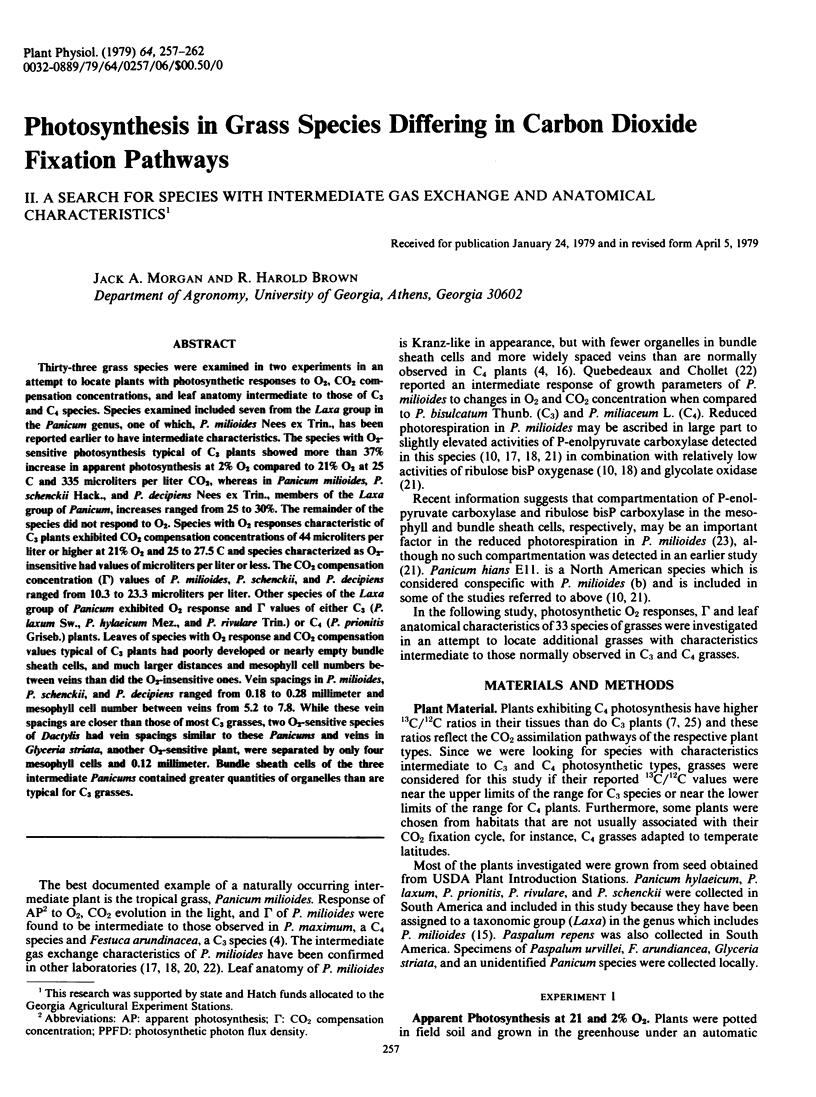
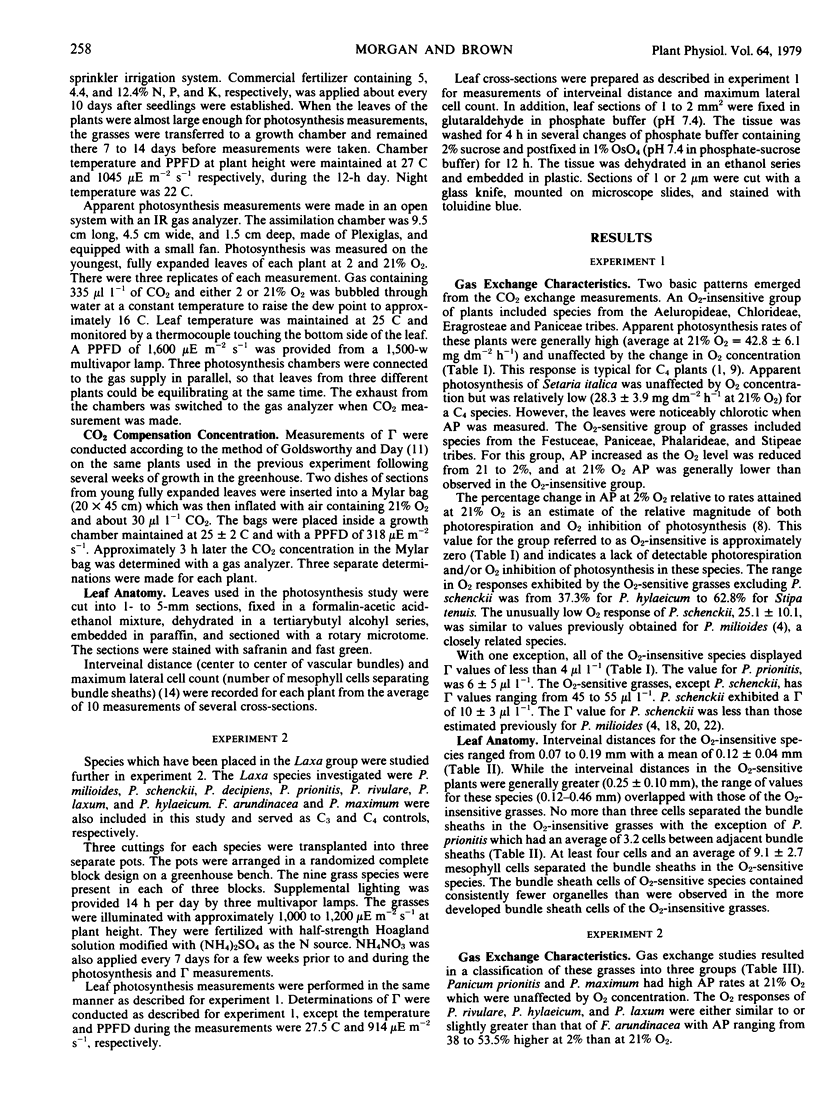
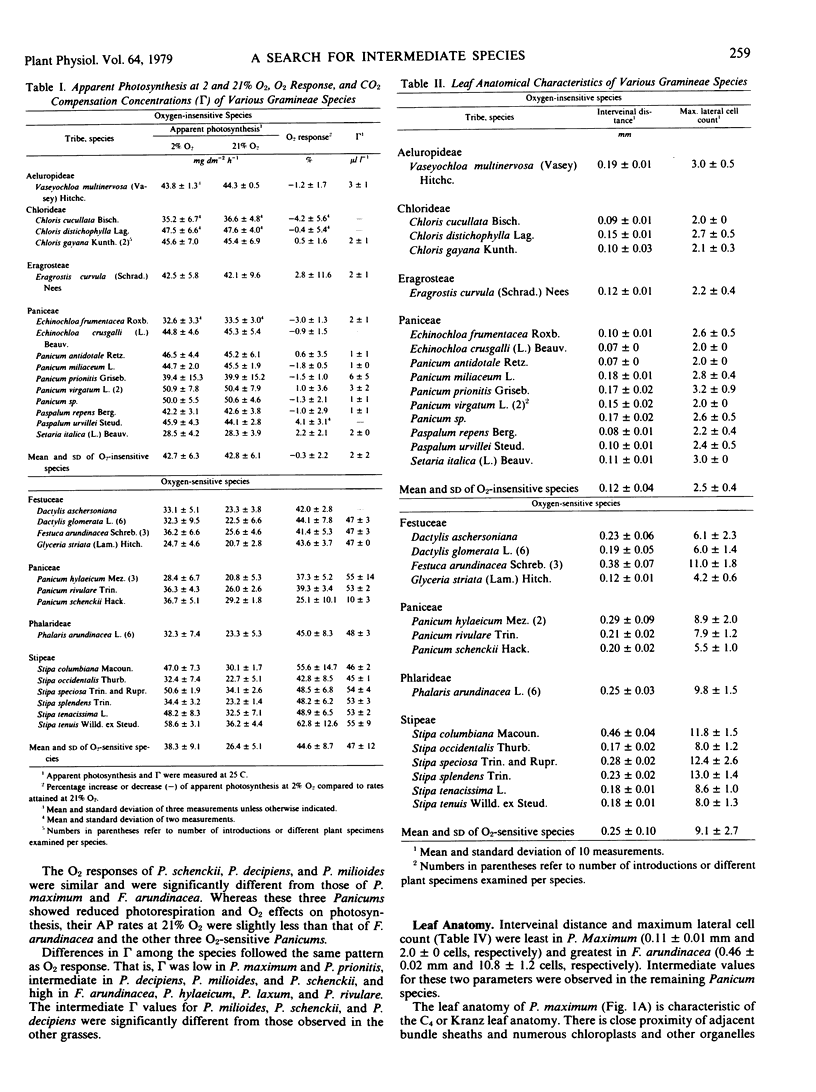
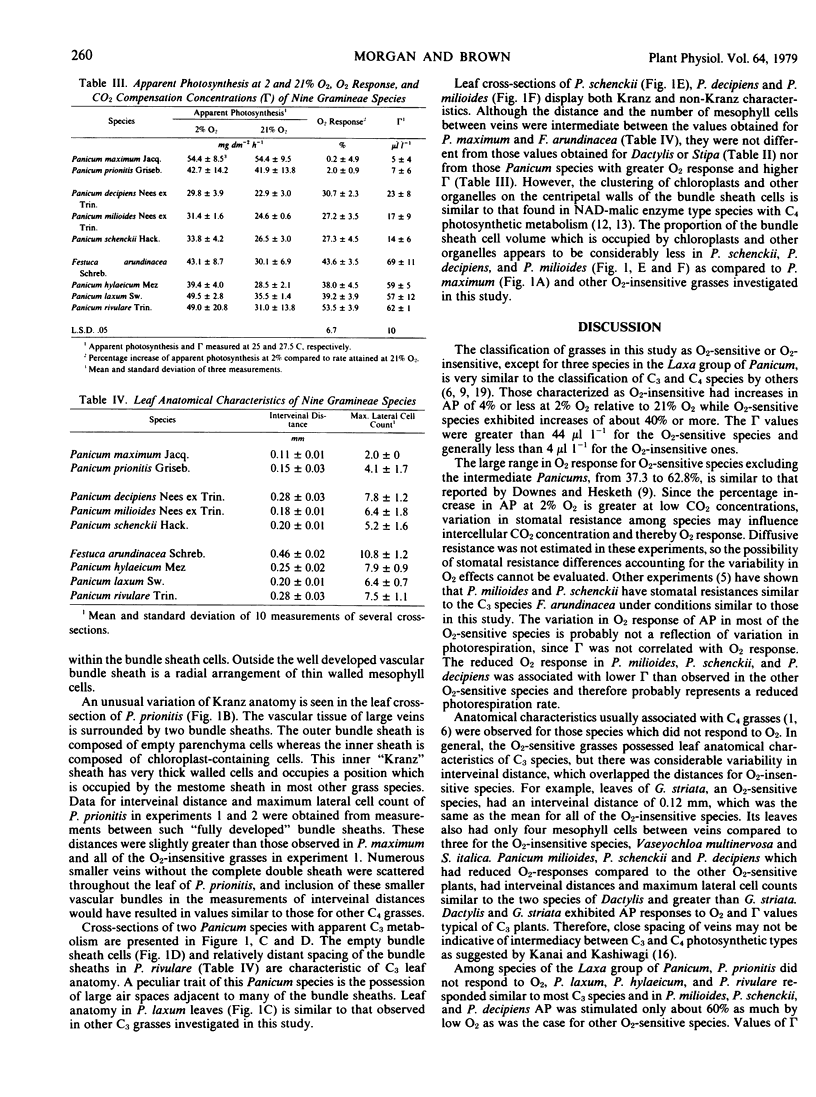
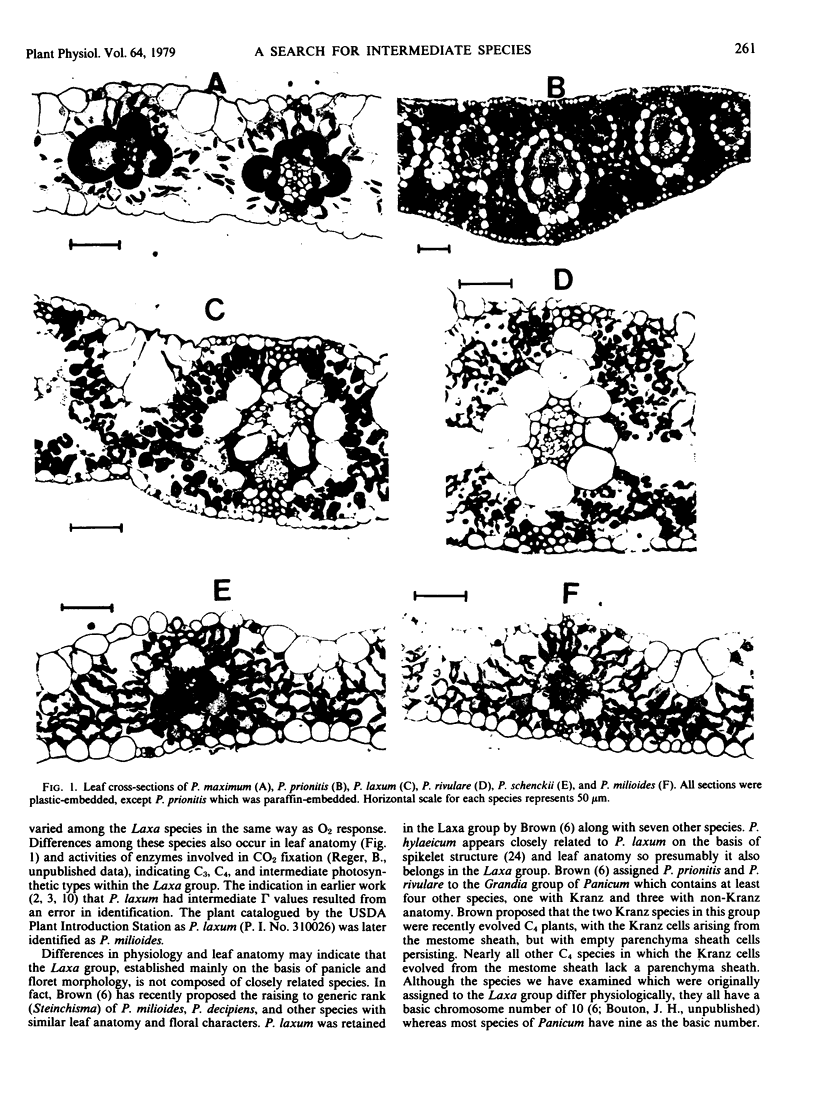
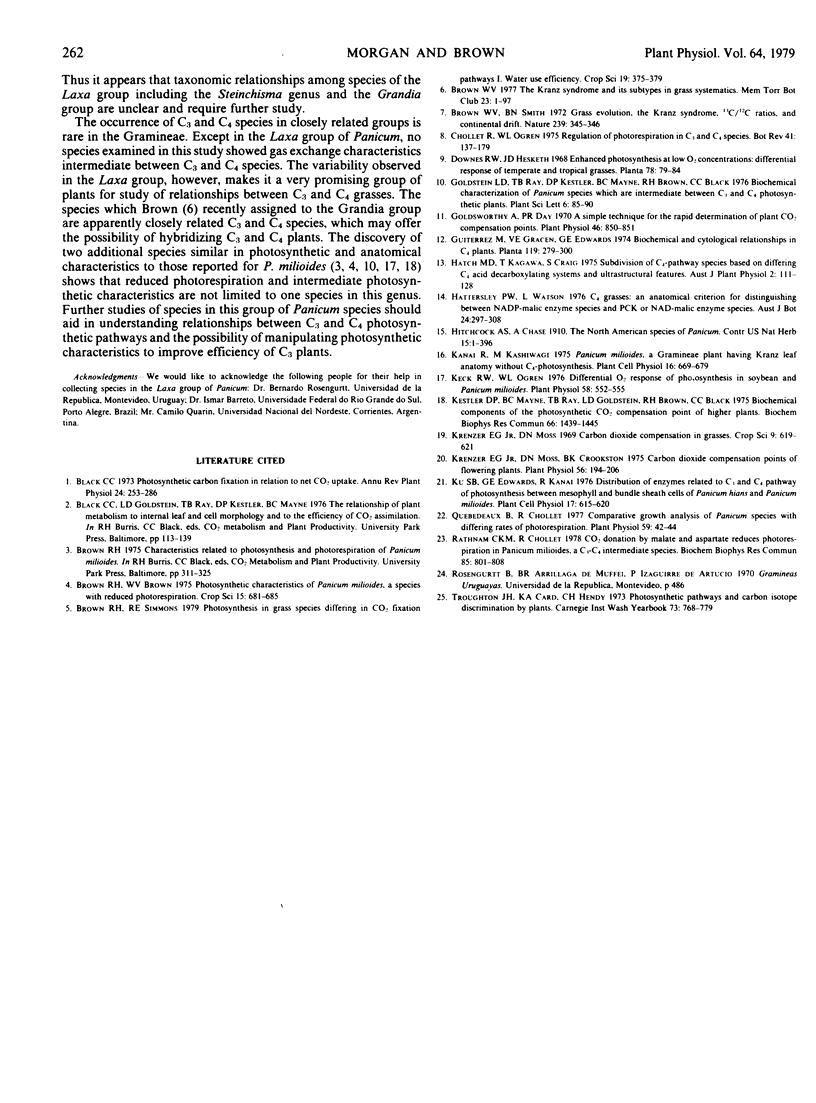
Images in this article
Selected References
These references are in PubMed. This may not be the complete list of references from this article.
- Brown W. V., Smith B. N. Grass evolution, the Kranz syndrome, 13C/12C ratios, and continental drift. Nature. 1972 Oct 6;239(5371):345–346. doi: 10.1038/239345a0. [DOI] [PubMed] [Google Scholar]
- Goldsworthy A., Day P. R. A Simple Technique for the Rapid Determination of Plant CO(2) Compensation Points. Plant Physiol. 1970 Dec;46(6):850–851. doi: 10.1104/pp.46.6.850. [DOI] [PMC free article] [PubMed] [Google Scholar]
- Keck R. W. Differential Oxygen Response of Photosynthesis in Soybean and Panicum milioides. Plant Physiol. 1976 Oct;58(4):552–555. doi: 10.1104/pp.58.4.552. [DOI] [PMC free article] [PubMed] [Google Scholar]
- Kestler D. P., Mayne B. C., Ray T. B., Goldstein L. D., Brown R. H., Black C. C. Biochemical components of the photosynthetic CO2 compensation point of higher plants. Biochem Biophys Res Commun. 1975 Oct 27;66(4):1439–1446. doi: 10.1016/0006-291x(75)90520-3. [DOI] [PubMed] [Google Scholar]
- Krenzer E. G., Moss D. N., Crookston R. K. Carbon dioxide compensation points of flowering plants. Plant Physiol. 1975 Aug;56(2):194–206. doi: 10.1104/pp.56.2.194. [DOI] [PMC free article] [PubMed] [Google Scholar]
- Quebedeaux B., Chollet R. Comparative growth analyses of panicum species with differing rates of photorespiration. Plant Physiol. 1977 Jan;59(1):42–44. doi: 10.1104/pp.59.1.42. [DOI] [PMC free article] [PubMed] [Google Scholar]
- Rathnam C. K., Chollet R. CO2 donation by malate and aspartate reduces photorespiration in Panicum milioides, a C3-C4 intermediate species. Biochem Biophys Res Commun. 1978 Nov 29;85(2):801–808. doi: 10.1016/0006-291x(78)91233-0. [DOI] [PubMed] [Google Scholar]



